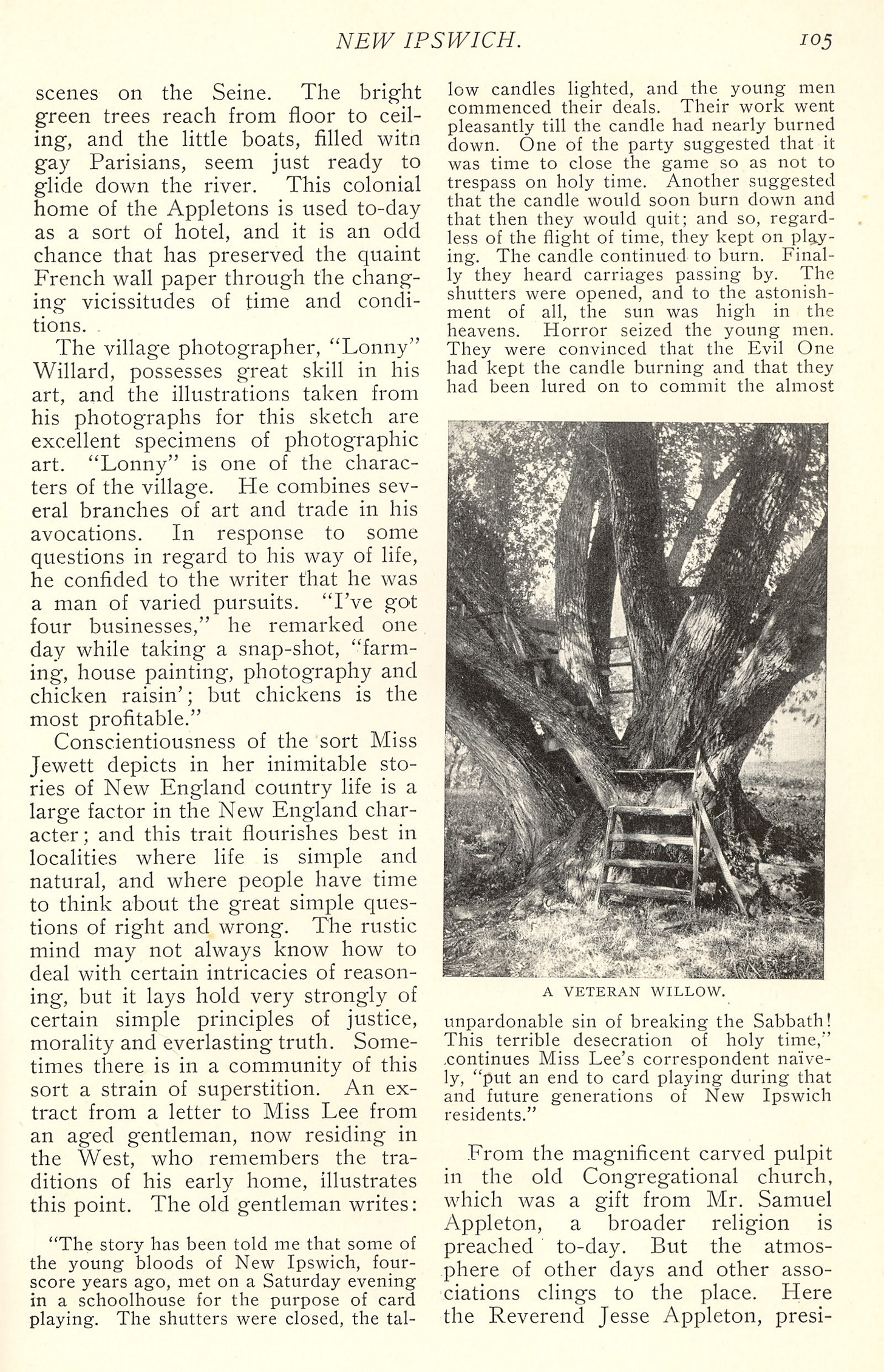Recap of Page 104
Page 105
…scenes on the Seine. The bright green trees reach from floor to ceiling, and the little boats, filled with gay Parisians, seem just ready to glide down the river. This colonial home of the Appletons is used to-day as a sort of hotel, and it is an odd chance that has preserved the quaint French wall paper through the changing vicissitudes of time and conditions.
The village photographer, "Lonny" Willard, possesses great skill in his art, and the illustrations taken from his photographs for this sketch are excellent specimens of photographic art. "Lonny" is one of the characters of the village. He combines several branches of art and trade in his avocations. In response to some questions in regard to his way of life, he confided to the writer that he was a man of varied pursuits. "I've got four businesses," he remarked one day while taking a snapshot, "farming, house painting, photography and chicken raisin'; but chickens is the most profitable."
Conscientiousness of the sort Miss Jewett depicts in her inimitable stories of New England country life is a large factor in the New England character; and this trait flourishes best in localities where life is simple and natural, and where people have time to think about the great simple questions of right and wrong. The rustic mind may not always know how to deal with certain intricacies of reasoning, but it lays hold very strongly of certain simple principles of justice, morality and everlasting truth. Sometimes there is in a community of this sort a strain of superstition. An extract from a letter to Miss Lee from an aged gentleman, now residing in the West, who remembers the traditions of his early home, illustrates this point. The old gentleman writes:
"The story has been told me that some of the young bloods of New Ipswich, fourscore years ago, met on a Saturday evening in a schoolhouse for the purpose of card playing. The shutters were closed, the tallow candles lighted, and the young men commenced their deals. Their work went pleasantly till the candle had nearly burned down. One of the party suggested that it was time to close the game so as not to trespass on holy time. Another suggested that the candle would soon burn down and that then they would quit; and so, regardless of the flight of time, they kept on playing. The candle continued to burn. Finally they heard carriages passing by. The shutters were opened, and to the astonishment of all, the sun was high in the heavens. Horror seized the young men. They were convinced that the Evil One had kept the candle burning and that they had been lured on to commit the almost unpardonable sin of breaking the Sabbath! This terrible desecration of holy time," continues Miss Lee's correspondent naïvely, "put an end to card playing during that and future generations of New Ipswich residents."
From the magnificent carved pulpit in the old Congregational church, which was a gift from Mr. Samuel Appleton, a broader religion is preached to-day. But the atmosphere of other days and other associations clings to the place. Here the Reverend Jesse Appleton, president…
(continued tomorrow)
On this day - January 16, 1898
William Jurian Kaula diary
16 JAN 1898
I slept in the "Menagerie" last night and occupied my old room of last winter. I have been so nervous during the week that I have not slept well. I found the hotel so damp and cold that I nearly froze and wondered how I stood it last winter. I do not wonder now why I was not well there. Living in a studio is the most comfortable and practical way for a student of small income.
The French students had a demonstration yesterday in the morning and afternoon over the Dreyfus Affair. It was mainly to denounce M. Zola and posing as champions of the army. The effervescence was, however, more gay than annoying, though the Prefecture of the Police had taken serious precautions - perhaps more serious than the circumstances necessitated.
On this day - January 16, 1909
James Roger diary entry
16th (Saturday)
Intense frost 2 below zero wind north. David went to Balch’s and took cart of hay to W. Davis at Davis Village and went to Depot to meet Berkley, Margret & Elizabeth who came by the 2 train, Got letters from Alice & Hamish. Grampy Cochrane died Thursday night. Hamish is going to Boston tomorrow and to Ayer at night. I swept Church &c.




The rustic mind today has to deal with more than 'intricacies of reasoning' today. Common sense and reasoning seem to be relics of the past.
I had a friend, the late David Cochrane, and wonder it he was related to Grampy Cochrane. The weather in James' diary matches today's weather. Also another letter from Hamish. What was the postage back then? My guess would be 1 cent.